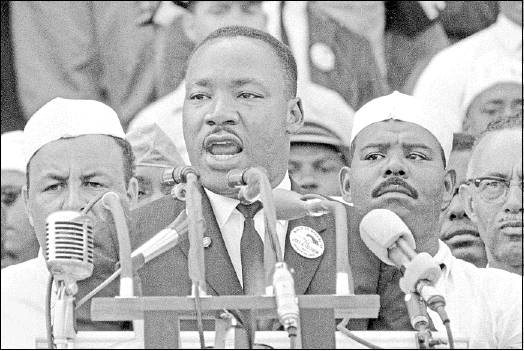STAFF REPORTS | MARTIN LUTHER KING JR. DAY
Being True to King
Beyond the Dream, a more accurate view of his ideas.
By Valerie Russ STAFF WRITER
The legacy of the Rev. Dr. Martin Luther King Jr. is often celebrated by conjuring his words spoken at the 1963 March on Washington for Jobs and Freedom. His “I Have a Dream” speech has come to be remembered as inspired, rousing, and optimistic about race relations in America.
“With this faith, we will be able to transform the jangling discords of our nation into a beautiful symphony of brotherhood,” he said on that August day in Washington.
Increasingly, though, black Americans want new ways to analyze and celebrate his legacy, more accurately.
“America has been comfortable with Dr. King the dreamer as opposed to Dr. King who articulates the American nightmare,” said the Rev. Mark Kelly Tyler, pastor of the historic Mother Bethel AME Church.
The man who was assassinated in Memphis on April 4, 1968, at age 39, denounced racism, materialism, and militarism. He predicted social ills would never be solved without fixing entrenched inequity. And he called out U.S. economic policy.
In fact, many activists who are asking today for reparations to repair the damage black Americans have suffered — a subject that last year rose to the level of presidential candidate debates — borrow rhetoric from King’s combative speeches.
Often cited by the American Descendants of Slavery is a quote from his 1968 speech called “Two Nations of Black America,” in which King talks about the unfair practices of the federal government.
In the next campaign on Washington, King said, “we’re coming to get our check.”
By 1967, King came to confess in an interview with NBC News correspondent Sander Vanocur: “That dream I had that day has, at many points, turned into a nightmare.”
Yet, said Solomon Jones, a host for Philadelphia radio station WURD and a columnist for The Inquirer, America has come to sanitize King’s ideas to prevent them from growing into a larger movement.
“ ‘I Have a Dream’ allows for the status quo to remain,” Jones said. “It doesn’t allow his dream to say, ‘We want equal opportunity in jobs, in housing, and in every aspect of society that King spoke out for.”
The irony, though, said Anthony Monteiro, a former Temple University professor and panelist at the third annual “Radical MLK Symposium,” sponsored by Uncle Bobbie’s Coffee & Books on Friday, is that King had always been radical, long before his speech at the March on Washington.
“King once said that the bombs that were dropped in Vietnam exploded in Watts, Detroit, and Philadelphia,” he added. “He meant that spending on war took away from the money needed in the United States to address poverty.”
Philadelphia lawyer and activist Michael Coard, cofounder of Avenging the Ancestors Coalition, said, “Anyone who reduces him to the 1963 ‘I Have a Dream’ speech knows very little about him.”
King, Coard said, was critical of capitalism and called for a better redistribution of wealth.
In that 1967 interview, King said: “There must be a revolution of values in our country, and as Jimmy Baldwin said, ‘What advantage is there to be integrated into a burning house?’ ”
Demanding reparations, said Chad Brown, a member of the Los Angeles ADOS movement, reflects a sentiment that shows up in several of King’s speeches, including when he talked about how the U.S. government gave “millions of acres of land to … immigrants from Europe,” but gave nothing to the black Americans “who came here in chains.”
In several speeches between 1967 and 1968, including his “Three Evils of Society” speech, King talked about how land-grant colleges were built to help white, immigrant farmers improve their soil, how low-interest loans were given, and how eventually, after the farmers became successful, millions in federal subsidies were paid to farmers to “not grow” crops.
Tyler, of Mother Bethel, said: “The dream is wonderful because the dream is general. It’s vague. … It’s a wonderful thing to talk about equality, fairness, and justice.”
But to attain true equality and justice, he said, King “put his finger on the pulse of a number of things” needed to eradicate poverty.
King himself said that integrating lunch counters and public parks was “easy” because it didn’t cost anything. But true equality would require spending money.
“We are confronting issues that can’t be solved without costing the nation billions of dollars,” King said. “We can’t get rid of slums and poverty without it costing the nation something.” vruss@inquirer.com
215-854-5987 ValerieRussDN
